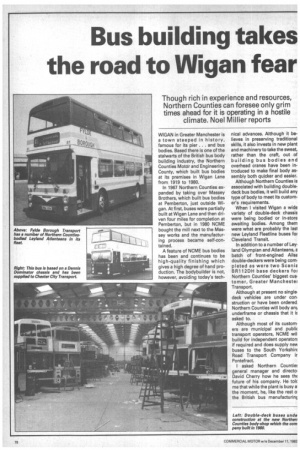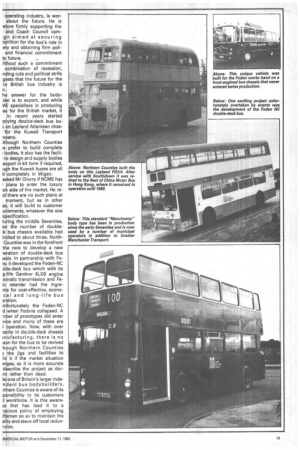Bus building takes the road to Wigan fear
Page 62

Page 63

If you've noticed an error in this article please click here to report it so we can fix it.
Though rich in experience and resources, Northern Counties can foresee only grim times ahead for it is operating in a hostile climate. Noel Millier reports
WIGAN in Greater Manchester is a town steeped in history, famous for its pier . . . and bus bodies. Based there is one of the stalwarts of the British bus body building industry, the Northern Counties Motor and Engineering County, which built bus bodies at its premises in Wigan Lane from 1919 to 1980.
In 1967 Northern Counties expanded by taking over Massey Brothers, which built bus bodies at Pemberton, just outside Wigan. At first, buses were partially built at Wigan Lane and then driven four miles for completion at Pemberton, but in 1980 NCME bought the mill next to the Massey works and the manufacturing process became self-contained.
A feature of NCME bus bodies has been and continues to be high-quality finishing which gives a high degree of hand production. The bodybuilder is not, however, avoiding today's tech nical advances. Although it believes in preserving traditional skills, it also invests in new plant and machinery to take the sweat, rather than the craft, out of building bus bodies and overhead cranes have been introduced to make final body assembly both quicker and easier.
Although Northern Counties is associated with building doubledeck bus bodies, it will build any type of body to meet its customer's requirements.
When I visited Wigan a wide variety of double-deck chassis were being bodied or in-store awaiting bodies. Among them were what are probably the last new Leyland Fleetline buses for Cleveland Transit.
In addition to a number of Leyland Olympian and Atlanteans, a batch of front-engined Ailsa double-deckers were being completed as were two Scania BR11 2DH base deckers for Northern Counties' biggest customer, Greater Manchester Transport.
Although at present no single. deck vehicles are under con. struction or have been ordered Northern Counties will body any underframe or chassis that it if. asked to.
Although most of its customers are municipal and public transport operators, NCME wil build for independent operator: if required and does supply nev■ buses to the South YorkshirE Road Transport Company ir Pontefract.
I asked Northern Countiel general manager and directoi David Cherry how he sees thE future of his company. He tolc me that while the plant is busy a the moment, he, like the rest o the British bus manufacturinc
operating industry, is worabout the future. He is .efore firmly supporting the and Coach Council camgn aimed at securing
)gnition for the bus's role in ety and obtaining firm poli
nd financial commitment ts future. li hout such a commitment
ombination of recession, n ing cuts and political strife g sts that the future for the r British bus industry is n.
h answer for the bodyr is to export, and while VI specialises in producing e for the British market, it in recent years started ip ying double-deck bus bo; n Leyland Atlantean chasf r the Kuwait Transport n any.
it ough Northern Counties is prefer to build complete odies, it also has the faciliti design and supply bodies
e port in kit form if required, ugh the Kuwait buses are all It completely in Wigan.
asked Mr Cherry if NCME has plans to enter the luxury Ich side of the market. He reid there are no such plans at moment, but as in other as, it will build to customer uirements, whatever the size specification.
luring the middle Seventies, en the number of double:k bus chassis available had indled to about three, NorthCounties was in the forefront the race to develop a new ieration of double-deck bus issis. In partnership with Fo
s it developed the Foden-NC Jble-deck bus which with its g-life Gardner 6LXB engine omatic transmission and Felo retarder had the ingrents for cost-effective, econocal and long-life bus ration.
Infortunately the Foden-NC d when Fodens collapsed. A Tiber of prototypes did enter vice and many of these are I operation. Now, with over )acity in double-deck chassis inufacturing, there is no son for the bus to be revived hough Northern Counties ; the jigs and facilities to Id it if the market situation mges, so it is more accurate describe the project as dorfr rather than dead.
ks one of Britain's larger indendent bus bodybuilders, rthern Counties is aware of its ponsibility to its customers 1 workforce. It is this aware55 that has lead it to a lscious policy of employing ftsmen so as to maintain the al ty and stave off local redunncies.
































































